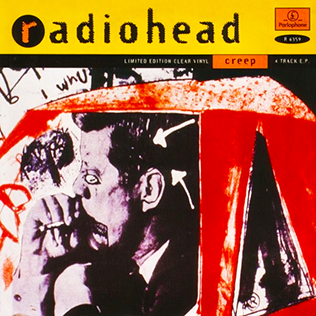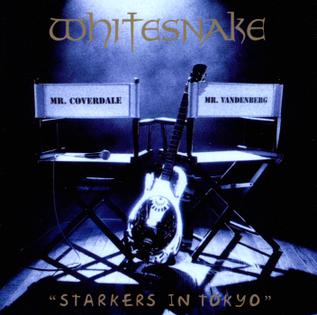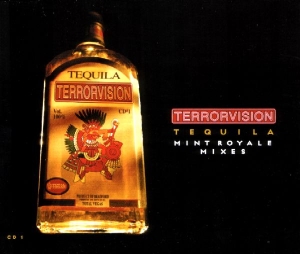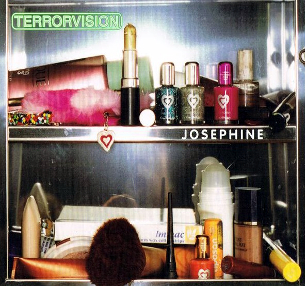
Don Valley Stadium in Sheffield, South Yorkshire, England, was completed in 1990, and hosted the 1991 World Student Games. It was named after the nearby River Don. The stadium was demolished in 2013.
Terrorvision are an English rock band. They were formed in 1987 in Keighley, West Yorkshire, England, and initially disbanded in 2001. The band used Bradford as a base after the name change to Terrorvision in 1991, by which time the band members had all moved there.

"Creep" is the debut single by the English rock band Radiohead, released on 21 September 1992. It was included as the second track of Radiohead's debut album, Pablo Honey (1993). It features "blasts" of guitar noise by Jonny Greenwood and lyrics describing an obsessive unrequited attraction.

How to Make Friends and Influence People is the second album by the rock band Terrorvision, released in 1994 on Total Vegas Recordings. "Oblivion", "Middleman", "Pretend Best Friend", "Alice What's the Matter", and "Some People Say" were all released as singles. The title refers to the Dale Carnegie book How to Win Friends and Influence People. The album was recorded in 17 days.
"Mama Told Me Not to Come", also written as "Mama Told Me (Not to Come)", is a song by American singer-songwriter Randy Newman written for Eric Burdon's first solo album in 1966. Three Dog Night's 1970 cover topped the US pop singles chart. Tom Jones and Stereophonics' version also reached No. 4 on the UK Singles Chart in 2000.

"Rainmaker" is the 37th single by English heavy metal band Iron Maiden. It was released on 24 November 2003 as the second and final single from their 13th studio album, Dance of Death (2003). It was written by Dave Murray, Steve Harris and Bruce Dickinson, and produced by Harris and Kevin Shirley.

"Black Horse and the Cherry Tree" is a song by Scottish singer-songwriter KT Tunstall from her 2004 debut album, Eye to the Telescope. It is one of many songs that reuses the Bo Diddley beat from the 1955 song of his own name. The track was released on 21 February 2005 as the lead single from the album, charting at No. 28 on the UK Singles Chart the same month. The following year, the single became a hit outside Europe, reaching No. 7 in Canada and No. 20 in the United States and New Zealand.

Starkers in Tokyo is a live acoustic album and video recording by English rock band Whitesnake, released only in Japan on 9 September 1997. It is performed in the style of the Unplugged series and simply features David Coverdale on vocals and Adrian Vandenberg on acoustic guitar.

"Fingertips '93", is a song by Swedish pop duo Roxette, released as the third and final single from their fourth studio album, Tourism (1992), on 26 January 1993. The single was only released in a select few countries, including Belgium, Germany, the Netherlands, Sweden and Spain, and charted moderately. The song would be given a wider release when it was issued as one of the B-sides on the duo's proceeding single, "Almost Unreal", which was released four months later in May 1993.

"Mr. Writer" is a song by Welsh rock band Stereophonics, taken from their third album, Just Enough Education to Perform (2001). It was released on 19 March 2001, reaching number five on the UK Singles Chart, number seven in Ireland, and number 53 in Sweden, where it was the band's first and only single to chart.

"The Sensual World" is a song by English singer-songwriter Kate Bush. It was the title track and first single from her album of the same name, released in September 1989. The single entered and peaked at No. 12 on the UK Single Chart.

Steps in Time is the debut studio album by the English new wave band King, released in November 1984 by CBS Records. The album peaked at No. 6 on the UK Albums Chart and was certified Gold by the BPI.

Brown Rice, reissued as Don Cherry, is a studio album recorded in 1975 by trumpeter Don Cherry.

"Tequila" is a song by English rock band Terrorvision, written by the band and Chuck Rio and produced by Scottish musician Edwyn Collins. The song originally appeared on the band's fourth studio album, Shaving Peaches (1998), and was released as the album's second single on 18 January 1999. For the single release, English music producer Mint Royale remixed the track. These remixes were heavily championed by BBC Radio 1 DJ Zoe Ball, allowing the song to reach number two on the UK Singles Chart, becoming Terrorvision's highest-charting song in the UK. In 1999, the song won the Kerrang! Award for Best Single.

"Josephine" is a song by English rock band Terrorvision, which was released in 1998 as the lead single from their fourth studio album Shaving Peaches. The song was written by Terrorvision and produced by Edwyn Collins. "Josephine" reached No. 23 in the UK Singles Chart and remained in the Top 100 for two weeks. The song's music video was directed by Tomas Masin.

"Perseverance" is a song by English rock band Terrorvision, written by the band and produced by Gil Norton. Recorded at Parkgate Studios in Battle, England, it is the third track on their third studio album, Regular Urban Survivors (1996). The band's frontman, Tony Wright, composed the music by stitching together several guitar riffs and penned the lyric based on his personal opinions and experiences, including a line about whales and dolphins that has resounded with audiences.

The Finnish composer Jean Sibelius (1865–1957) was one of the most important symphonists of the early twentieth century: his seven symphonies, written between 1899 and 1924, are the core of his oeuvre and stalwarts of the standard concert repertoire. Many of classical music's conductor–orchestra partnerships have recorded the complete set, colloquially known as the "Sibelius cycle". Specifically, the standard cycle includes:

"III Wishes" is a song by English rock band Terrorvision, which was released in 1999 as the third and final single from their fourth studio album Shaving Peaches. The song was written by Terrorvision and produced by John Cornfield. "III Wishes" reached No. 42 in the UK Singles Chart and remained in the Top 100 for two weeks.

"Middleman" is a song by English rock band Terrorvision, which was released in June 1994 as the second single from their second studio album How to Make Friends and Influence People. The song was written by Terrorvision and produced by Gil Norton. "Middleman" reached No. 25 in the UK Singles Chart and remained in the Top 100 for five weeks. The song's music video was directed by Tim Royes and produced by Alan Wachs.

"Oblivion" is a song by English rock band Terrorvision. Written by the band and produced by Gil Norton, the song was included as the second track on the band's second studio album, How to Make Friends and Influence People (1994). Like most Terrorvision songs, "Oblivion" contains political themes, but according to bass player Leigh Marklew, the messages were not taken seriously because of the song's doo-wop chorus. Released as the album's first single on 28 March 1994, the song peaked at number 21 on the UK Singles Chart and number 65 in Australia.


















